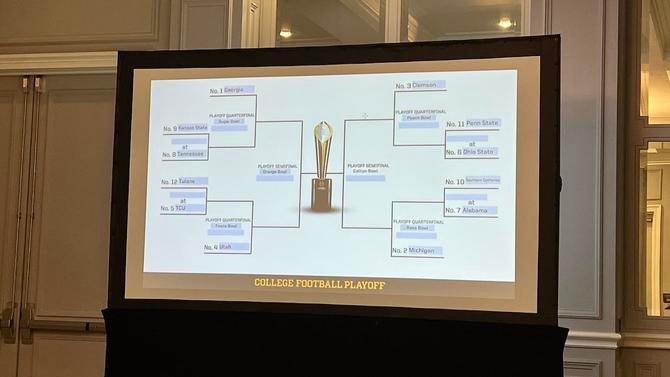
IRVING, Texas -- The College Football Playoff management committee gained some clarity over details of the upcoming 12-team playoff and positioning of the Army-Navy game during two days of meetings, which concluded Wednesday. However, the group ultimately left without discussing many long-term key priorities, including expansion or auto-bid structure.
The board, made up of the 10 FBS conference commissioners and new Notre Dame athletic director Pete Bevacqua, primarily dealt with recapping the 2023 playoff and organizing logistics of the upcoming 12-team playoff. (One key commissioner was not present due to a family matter.) The discussion was deep in minutia and included everything from ref assignments to family travel budgets for players, which increased from $1.5 million to $7.5 million as the CFP increases from funding three to 11 games.
"The four first-round games are arguably the biggest change in FBS football probably since the BCS came," executive director Bill Hancock said. "Only four schools will host those games, but 40 or so have to plan to host, so there are a lot of details in there."
This was the first meeting with the full board since the SEC and Big Ten strong-armed a much bigger slice of the longterm CFP revenue. Still, multiple sources described the attitude in the room as "collegial."
These meetings marked a period of transition for the CFP as college football enters its next form. Incoming executive director Richard M. Clark attended his first annual meeting as he prepares to take over for Hancock. Clark officially retires from his role as superintendent of the Air Force Academy at the end of May and joins the CFP full time in June. Additionally, incoming AAC commissioner Tim Pernetti joined Mike Aresco, who leaves his post at the end of the academic year.
Among the attendees was new Pac-12 commissioner Teresa Gold, who was promoted by Oregon State and Washington State. A source confirmed to CBS Sports that the Pac-12 is contractually mandated to have a seat and vote on the management committee through the end of the 2025 contract. Starting in 2026, the board will shrink to 10 total votes.
Regardless, the management committee clarified at its previous meeting that the two remaining Pac-12 schools will not be eligible for auto-bids in the first two years of the expanded 12-team College Football Playoff. Instead, they will compete as de facto FBS independents.
The Pac-12 is also set to lose its representative spot on the College Football Playoff committee. Pat Chun was named to the 13-member selection committee while athletic director at Washington State but will step down after leaving for the same role at rival Washington. The 13th slot will be filled by an at-large member, who will be named later.
Each power conference is guaranteed an athletic director on the selection committee, but the Big Ten already has chair Warde Manuel of Michigan as a representative.
Army-Navy not considered by CFP
The impact of future Army-Navy games was also among the firm decisions made during the CFP meetings. The annual rivalry between storied military academies will not be taken under consideration for CFP contention because it will be played after the selections have been made.
Previously, if a CFP spot hypothetically came come down to the Army-Navy game, the selection committee could have held until conclusion of the game. The protocols called for a teleconference immediately after the game to finalize any rankings or selection. In a 12-team playoff world, the time frame was too tight.
The selection committee consulted with officials from both schools, who were ultimately uninterested in moving the game.
"They both stressed that they wanted to keep their game where it's currently scheduled," Hancock said. "Understanding that neither team would have the benefit of an additional data point to be considered by the committee."
With Army set to join the AAC, either team would have a guaranteed 12 games played – including a conference championship game – by Selection Sunday. If one of the two schools made the first round of the CFP, it would play a game just one week later.
"There's a lot of complications with waiting a week when you've got a 12-team playoff," Aresco said. "It's one thing when you do a four-team playoff and you're not playing until the end of the month. And especially now, with that G5 slot, there's a reasonable chance with a good season that a service academy could have a great year and be a playoff team."
Mock selection
Commissioners went through a CFP bracketing exercise using the final 2022 rankings but with 2024 conference alignment (notably, with Utah serving as Big 12 champion). TCU and Ohio State, the No. 3 and No. 4 seeds in that year's playoff field, were bumped out of the top four in the 12-team mock because they lacked conference titles. Instead, No. 7 Clemson and No. 8 Utah moved up to the No. 3 seed and No. 4 seed, respectively. No. 16 Tulane captured the 12-seed as the fifth conference champion, which is guaranteed a slot but not a bye.
"We're going to have to educate people," Aresco said. "You're going to see champions who get ranked lower than the guys who are at-large. That's something we're going to have to explain."

If the 12-team CFP had existed in 2023, two SEC teams would have gotten bumped for others outside of the top 12. Arizona as a hypothetical Big 12 champ would have jumped to No. 4, ahead of Washington and Alabama (treating Texas as the SEC champ for the exercise). Liberty earned the Group of Five slot. Ole Miss and Oklahoma would have been pushed out of the field.
"We've said from the beginning that this is a possibility," SEC commissioner Greg Sankey said. "It's not a surprise."
For the next two years of the CFP contract, the bowls will lean on existing partnerships. The Big Ten will essentially be guaranteed a spot in the Rose Bowl for the quarterfinals. The ACC champion will get slotted in the Orange Bowl. The higher-ranked SEC or Big 12 champion will go to the Sugar Bowl. Even if a higher-ranked team had geographical priority, the existing contracts would take precedence. The bowl contracts expire after the 2025 playoff; there is no plan at this point about how bowl selection could work long term.
Notably, there is no policy about rematches or conference matchups in the early rounds of the College Football Playoff. In the exercise, the 2022 rankings produced an Ohio State-Penn State first round rematch in the 6-11 spot. Commissioners downplayed concerns, especially as the power conferences each swell past 16 teams.
"We're going to have some great matchups and some terrific locations," ACC commissioner Jim Phillips said. "I think this is going to be tremendous for the fans."
















